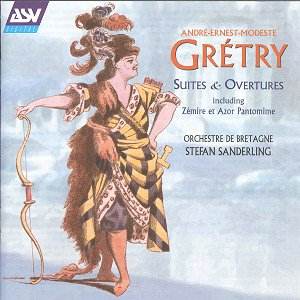André Ernest-Modeste GRÉTRY
(1741-1813)
Suites and Overtures
Céphale et Procris suite: Tambourin; Menuetto;
Gigue.
Le jugement de Midas: Overture
L'épreuve villageoise: Overture
Le tableau parlant: Overture
Le huron: Overture
Lucile suite: Overture; Entrée des paysans; Air de
danse.
Silvain: Overture
L'amitié à l'épreuve: Overture
L'ami de la maison suite Allegretto; Menuetto; Finale
(Presto)
Zémire et Azor suite (ed. Beecham): Entrée;
Passepied; Pantomime; Entr'acte; Finale.
Le magnifique: Overture
Guillaume Tell: Overture.
 Orchestre de Bretagne conducted by Stefan Sanderling
Orchestre de Bretagne conducted by Stefan Sanderling
 ASV CD DCA 1095 [70:20]
ASV CD DCA 1095 [70:20]
Crotchet
Amazon UK
AmazonUS

French of Walloon descent, André-Ernest-Modest Grétry was born
in Liège. He has been called the Molière of music. He studied
in Rome (1761-65) before settling in Paris. His style therefore easily
encompasses French German and Italian influences. His life spanned the period
from the death of Handel to the birth of Wagner - and he survived monarchy,
revolution and Napoleon!
Grétry's métier was the opéra-comique. He left
over 50 examples, nearly 40 of them were staged in Paris between January
1768 and the fall of the Bastille in 1789. They were highly successful
money-spinners. Not surprisingly, for his music is very approachable; light
frothy soufflés, sparkling and sunny - Grétry hardly wrote
anything in a minor key!
This album is a delicious confection -- what Beecham used to call bon-bons
or lollipops. Indeed the most substantial suite here is Beecham's editing
of Zémire and Azor with its charming frolicsome 'Passepied',
employing a glockenspiel, and the enchanting demurely romantic 'Pantomime'.
There is great wit here too. The story lines of most of the comic operas
are outrageous (you only have to look at the costume above to realise this)
and Grétry's music doesn't hesitate to parody and lampoon. Indeed,
in such pieces as Le jugement de Midas, the music approaches the
ridiculing of Peter Schickele's' PDQ Bach - in this particular piece there
are wild thunderbolts and simulated gales (a wind machine is used in Almeida's
editing). Influences of Mozart and Haydn are often evident, yet there is
something of an anticipation of Rossini too. Underneath all the bubbly and
frivolous music, however, there is considerable skill and innovation at work.
The complex presto string writing always impresses and there are many passages
and pieces that linger in the memory: the lovely Silvain Overture,
for instance, that trips daintily and merrily along, the sparkle of the
L'ami de la maison suite, especially the delightful 'Menuetto'; and
then there is the more dramatic Le magnifique overture with its off-stage
drum adding tension; and the artful use of the cow-horns in Guillaume
Tell.
A delightful compilation full of charm and sharply observed wit. Calculated
to cheer.
Ian Lace

